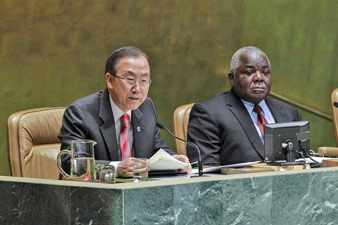By Saeed Shabazz-Staff Writer-

UNITED NATIONS (FinalCall.com) – Secretary-General Ban Ki-Moon opened the annual International Day of Remembrance of the Victims of Slavery and the Trans-Atlantic Slave Trade by calling on people to “address the lingering consequences” of slavery and to fight for equality, justice and peace.
The two-term UN secretary-general suggested the best way of honoring victims of the Trans-Atlantic Slave Trade “is by ending contemporary forms of slavery” such as human trafficking, child labor and sex slavery.
However, Mr. Ban never mentioned that the 2001 Durban Declaration and Program of Action acknowledged “slavery and the slave trade are crimes against humanity, and should have always been so.” And the former South Korean foreign minister never uttered the phrase “and reparations are due.”

“Recognition of March 25 as the UN Day of Remembrance of the victims of slavery and the Trans-Atlantic Slave Trade is on the cusp of turning into a fete of empty rhetoric dispensed by international civil servants,” said Dowoti Desir, founder of the DDPA Watchdog Group (Durban Declaration and Program of Action) on the organization’s Face Book page.
“A discourse of invisibility—make it seem as though subjects such as imperialism and colonization never existed,” Ms. Desir told The Final Call. Platitudes are paid to African descendants by the diplomatic community, yet full ratification of the Durban Declaration and Program of Action remain unmet. “Reparations for this crime against humanity are not even discussed,” she added.
And let’s not accept the fraudulent argument that the best way to honor the victims of historic slavery is by ending its present manifestations, Ms. Desir said. “You can’t compare apples to oranges; or as they say in Africa, goats to sheep,” she stressed.
Ambassador Ken Kanda of Ghana followed the secretary-general saying the International Day focused the world’s attention on the unprecedented horror of the slave trade; and called on the 194-member UN General Assembly to “acknowledge that the horror of slavery persisted in the twenty-first century.”
The United States Deputy Ambassador Rosemary DiCarlo described slavery as “one of the most painful chapters in my country’s history.”
Ambassador Jarmo Vinanen of Finland, speaking for the Group of Western European and Other States, said the “untold suffering” of victims of the Trans-Atlantic Slave Trade stood out as an “epic injustice.”
Grenada’s Ambassador Dessima M. Williams, speaking on behalf of the Group of Latin American and Caribbean States, said, “Entire economies in much of what is now known as the ‘developed world’ were literally built on the backs of this involuntary African labor, in large measure; therefore reparation was necessary in order to fully heal humanity.”
Ambassador Ahmad Allah-Mi of Chad, speaking on behalf of the African Group, told the gathering that for Africans and people of African descent, slavery and the Trans-Atlantic Slave Trade “were crimes against humanity.”
“The African Group, therefore, appealed for implementation of the United Nations Global Plan of Action on Trafficking in Persons and the Durban Declaration and Program of Action, its review and its tenth anniversary,” insisted Ambassador Allah-Mi.
“Reparations aren’t just for us Africans,” argues Ms. Desir, adding, “But also for those who perpetrated it as a healing mechanism.”
Adopted by consensus at the 2001 World Conference against Racism, known as the WCAR in Durban, South Africa; the Durban Declaration and Program of Action is a comprehensive, action-oriented document that proposes concrete measures to combat racism, racial discrimination, xenophobia and related intolerance. It calls for comprehensive national action plans to eradicate these scourges by reinforcement of national institutions and formulates concrete recommendations in the areas of national legislation and the administration of justice.
In 2009, delegates gathered in Geneva, Switzerland to review the progress of the Durban Declaration and Program of Action, and in 2011 a high-level meeting at the ministerial level was held in New York at the United Nations. At each session participants argued that the Durban Declaration and Program of Action was the right plan going forward, however, the full UN General Assembly has not adopted it as a relevant UN program.
“No, we should not stop making reparations a demand,” argues Saladin Muhammad, national chairperson of the North Carolina-based Black Workers for Justice and the Black Left Forum. “When we see how Black people are suffering in America today, this whole question about reparations becomes clear,” Mr. Muhammad told The Final Call.
Infant mortality, mental health, police killing Black people every 36-hours, jails filled with Black youth are tied to the crime of Trans-Atlantic Slave Trade, he added.
“The issue that the UN fears is by calling the slave trade a crime against humanity, it puts governments on trial, because the trade was sanctioned by governments,” Mr. Muhammad said.
The Durban Declaration and the Plan of Action are not laws, but a moral roadmap, which remains relevant in 2013, insists Ms. Desir.
In referring to the UN commemoration of the slave trade, she said, “The lion roars but he has no teeth, the DDPA is the teeth.”
The secretary-general’s spokesman did not respond to a Final Call request for comment.












